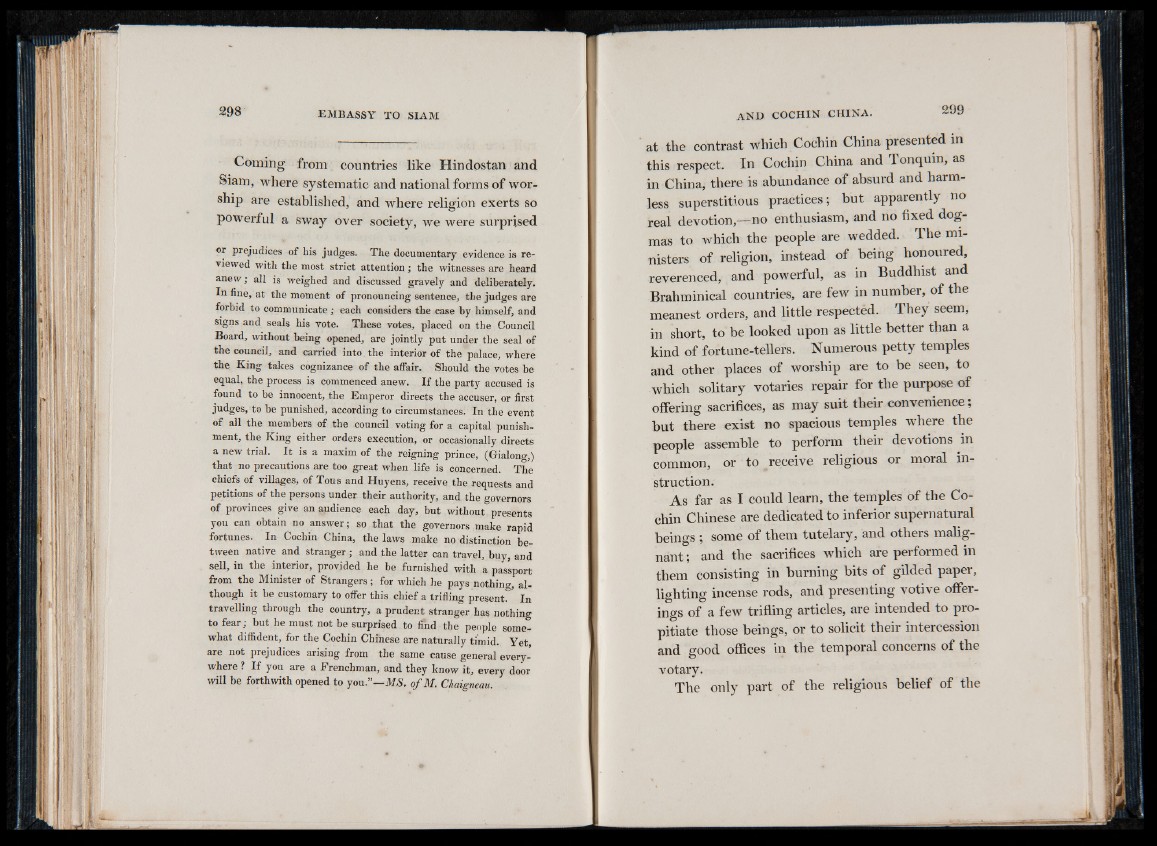
Coming from countries like Hindostán and
Siam, where systematic and national forms of worship
are established, and where religión exerts so
powerful a sway over society, we were surprised
■or prejudices of his judges. The documentary evidence is reviewed
with the most strict attention; the witnesses are heard
anew; ail is weighed and discussed gravely and deliberately.
In fine, at the moment of pronouncing sentence, the judges are
forbid to communicate; each considers the case by himself, and
signs and seals his vote. These votes, placed on the Council
Board, without being opened, are jointly put under the seal of
the council, and carried into the interior of the palace, where
the King takes cognizance of the affair. Should the votes be
equal, the process is commenced anew. If the party accused is
found to be innocent, the Emperor directs the accuser, or first
judges, to be punished, according to circumstances. In the event
of all the members of the council voting for a capital punishment,
the King either orders execution, or occasionally directs
a new trial. It is a maxim of the reigning prince, (Gialong,)
that no precautions are too great when life is concerned. The
chiefs of villages, of Tous and Huyens, receive the requests and
petitions of the persons under their authority, and the governors
of provinces give an audience each day, but without presents
you can obtain no answer; so that the governors make rapid
fortunes. In Cochin China, the laws make no distinction between
native and stranger; and the latter can travel, buy, and
seU, in the interior, provided he be furnished with a passport
from the Minister of Strangers; for which he pays nothing, although
it be customary to offer this chief a trifling present. * In
travelling through the country, a prudent stranger has nothing
to fear; but he must not be surprised to find the people somewhat
diffident, for the Cochin Chinese are naturally timid. Yet
are not prejudices arising from the same cause general everywhere
? I f you are a Frenchman, and they know it, every door
will be forthwith opened to you.”—MS. o f M. Chaigneau.
at the contrast which Cochin China presented in
this respect. In Cochin China and Tonquin, as
in China, there is abundance of absurd and harmless
superstitious practices; but apparently no
real devotion,—no enthusiasm, and no fixed dogmas
to which the people are wedded. The ministers
of religion, instead of being honoured,
reverenced, and powerful, as in Buddhist and
Brahminical countries, are few in number, of the
meanest orders, and little respected. They seem,
in short, to be looked upon as little better than a
kind of fortune-tellers. Numerous petty temples
and other places of worship are to be seen, to
which solitary votaries repair for the purpose of
offering sacrifices, as may suit their convenience;
but there exist no spacious temples where the
people assemble to perform their devotions in
common, or to receive religious or moral instruction.
As far as I could learn, the temples of the Cochin
Chinese are dedicated to inferior supernatural
beings ; some of them tutelary, and others malignant;
and the sacrifices which are performed in
them consisting in burning bits of gilded paper,
lighting incense rods, and presenting votive offerings
of a few trifling articles, are intended to propitiate
those beings, or to solicit their intercession
and good offices in the temporal concerns of the
votary.
The only part of the religious belief of the